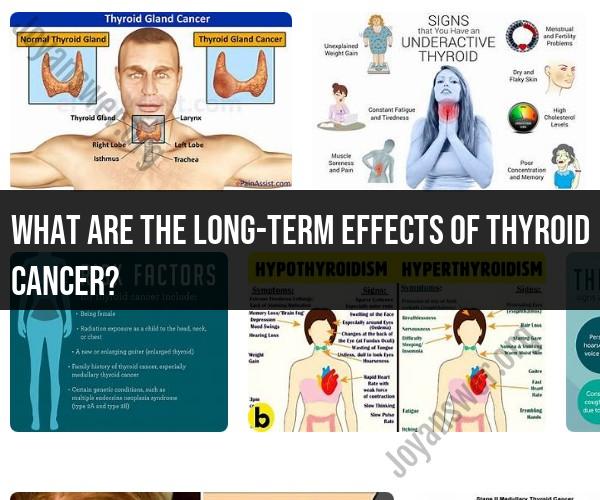What are the long-term effects of thyroid cancer?
Thyroid cancer is generally considered one of the most treatable cancers, and the long-term prognosis is often quite good, especially when detected and treated early. However, like any medical condition, thyroid cancer and its treatment can have long-term effects and considerations. Here are some of the potential long-term effects of thyroid cancer:
Hypothyroidism: One of the most common long-term effects of thyroid cancer treatment is hypothyroidism. This occurs when the thyroid gland is removed or damaged by radiation treatment. Hypothyroidism can lead to fatigue, weight gain, cold intolerance, and other symptoms. Many people with hypothyroidism will need to take thyroid hormone replacement medication for the rest of their lives.
Vocal Cord Damage: Surgery to remove the thyroid gland may involve the risk of damaging the recurrent laryngeal nerve, which can lead to voice changes and difficulty swallowing.
Calcium Imbalance: Damage to the parathyroid glands, which regulate calcium levels in the body, can occur during thyroid surgery. This may result in temporary or permanent changes in calcium levels, leading to symptoms like muscle cramps, tingling, and numbness.
Scarring: Surgery for thyroid cancer can result in scarring, which can be visible and may cause discomfort or tightness in the neck.
Cancer Recurrence: While thyroid cancer is often curable, there is a risk of cancer recurrence, especially with certain subtypes like anaplastic thyroid cancer or poorly differentiated thyroid cancer.
Secondary Cancers: Some treatments for thyroid cancer, such as radiation therapy, may slightly increase the risk of developing secondary cancers in the long term.
Psychological and Emotional Effects: Living with thyroid cancer and undergoing treatment can have emotional and psychological effects, including anxiety and depression.
Dietary and Lifestyle Changes: Some people may need to make dietary or lifestyle changes, such as adjusting their iodine intake or avoiding certain foods, especially if radioactive iodine therapy is part of their treatment.
Cardiovascular Risks: Hypothyroidism and certain types of thyroid cancer may be associated with a slightly increased risk of cardiovascular problems in the long term.
It's important to note that not all thyroid cancer survivors will experience these long-term effects, and the severity of these effects can vary greatly from person to person. Regular follow-up care with a healthcare provider who specializes in thyroid cancer is essential to monitor for any potential long-term effects and provide appropriate treatment or management.
Thyroid cancer treatment and management have evolved, and newer approaches are designed to minimize long-term side effects. Patients should discuss their individual risk factors, treatment options, and long-term management with their healthcare team to develop a plan tailored to their specific situation.
Thyroid Cancer Long-Term Effects: Understanding Health Consequences
Thyroid cancer is a type of cancer that starts in the thyroid gland. The thyroid gland is a small gland in the neck that produces hormones that control metabolism, growth, and development.
Most people with thyroid cancer have a good prognosis, but there are some potential long-term effects of the disease and its treatment. These effects can vary depending on the type of thyroid cancer, the stage of the cancer at diagnosis, and the type of treatment received.
Some of the potential long-term effects of thyroid cancer include:
- Hypothyroidism: This is a condition in which the thyroid gland does not produce enough thyroid hormone. Hypothyroidism can cause a variety of symptoms, including fatigue, weight gain, sensitivity to cold, and constipation.
- Hyperthyroidism: This is a condition in which the thyroid gland produces too much thyroid hormone. Hyperthyroidism can cause a variety of symptoms, including anxiety, weight loss, intolerance to heat, and a rapid heartbeat.
- Recurrent thyroid cancer: This occurs when the cancer returns after treatment. Recurrent thyroid cancer is usually treated with surgery and/or radioactive iodine therapy.
- Second cancers: Some people with thyroid cancer are at an increased risk of developing other types of cancer, such as leukemia and lymphoma.
- Side effects of treatment: Some of the side effects of thyroid cancer treatment, such as radiation therapy and radioactive iodine therapy, can be long-lasting. These side effects may include dry mouth, difficulty swallowing, and hearing loss.
Life After Thyroid Cancer: Long-Term Impact on Health
For many people, life after thyroid cancer is very good. They are able to return to their normal activities and live a full and productive life. However, it is important to be aware of the potential long-term effects of the disease and its treatment.
People with thyroid cancer should see their doctor regularly for follow-up care. This will involve having blood tests to check their thyroid hormone levels and to monitor for any signs of recurrence. People with thyroid cancer may also need to take medication to replace the thyroid hormone that their thyroid gland no longer produces.
Surviving Thyroid Cancer: Long-Term Health Considerations
There are a number of things that people who have survived thyroid cancer can do to stay healthy and manage the long-term effects of the disease and its treatment. These include:
- Eating a healthy diet: Eating a healthy diet can help to maintain a healthy weight and reduce the risk of other health problems, such as heart disease and stroke.
- Exercising regularly: Exercise can help to improve mood, energy levels, and overall health.
- Getting enough sleep: Sleep is essential for good health. People with thyroid cancer may need to get more sleep than usual due to the fatigue that is often associated with the disease and its treatment.
- Managing stress: Stress can worsen the symptoms of thyroid cancer and make it more difficult to cope with the disease. It is important to find healthy ways to manage stress, such as exercise, yoga, or meditation.
If you are a survivor of thyroid cancer, it is important to talk to your doctor about your long-term health care needs. Your doctor can help you to develop a plan to manage the long-term effects of the disease and its treatment and to stay healthy overall.












